PROVINCETOWN — Salvador R. Vasques III, that handsome boy from Washington Avenue who often went fishing on his dad’s dragger, jumped into a red Datsun 1600 convertible one day in 1965, pointed it toward California, and never looked back.
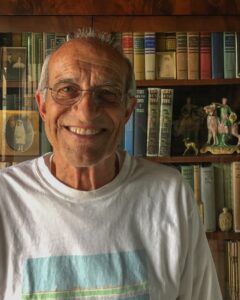
Only, he never really left town.
Vasques’s passion for his birthplace took the form of what he called his “memorabilia collection” — thousands of Provincetown-themed postcards and stereopticon cards, photographs, paintings, prints, books, brochures, pamphlets, magazines, maps, matchbooks, commemorative china and glassware, scrimshaw, silver spoons, silk pillow coverings, bookends, novelties, trinkets, and tchotchkes — filling 19 oak filing cabinets, four barrister bookcases, a 32-drawer oak card cabinet, and wherever else he could find room at the home in San Diego he shares with John Contratti, his partner of 49 years.
It is among the finest and most extensive collections of Provincetown-related materials in private hands.
And now it is making its way back home. Vasques announced Monday that he is donating his entire collection to the Pilgrim Monument and Provincetown Museum. In a phone conversation during a break from packing, he said he was even paying the shipping costs.
“I’m 83,” he said. “If I die tomorrow, John would be left with the collection. I know he’d get it back there, but I want to do it while I’m alive.”
Vasques said he will continue posting images on his Facebook page, “My Provincetown Memorabilia Collection,” which has more than 9,000 members.
“We are so honored that he chose us,” Courtney Hurst, the interim executive director of the monument and museum, said in a telephone interview on Monday.
She and Vasques reached an agreement in person when he was in town last May. “I had tears in my eyes,” Hurst recalled. “I understood the magnitude of this gift.”
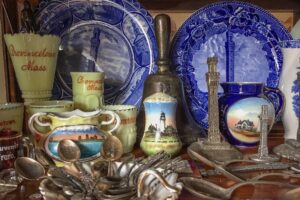
Like Vasques, Hurst grew up in Provincetown. The branches of their family trees intertwine. A snapshot of young Sal aboard his father’s boat also shows Hurst’s grandfather Anthony Joseph.
Hurst said the Vasques donation marked a return of the museum’s interest in acquiring historical materials after a yearslong moratorium and that a full-time curator would “eventually” be hired.
“We are going to be opening our doors much more,” she said. “We are open to receiving things and discussing things.” Catching herself, she quickly added, “But let’s not have a line out the door.”
When Vasques’s collection arrives late this month or in early October, Hurst said, it will be placed in the east gallery, to the left of the gift shop, where temporary shows are typically mounted. She said the museum will be hiring people as needed to help unpack and process the collection with a view toward an exhibition next year about Vasques and his archive.
Curation of the exhibition would involve Vasques to whatever degree he wishes. “We want him to be part of it and the stories we tell with it,” Hurst said.
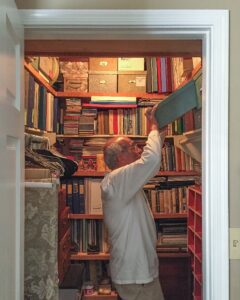
Those stories begin in 1959 when Nellie Frade, a friend of the Vasques family, gave 18-year-old Sal an album filled with Provincetown postcards from the early 1900s. He caught the collecting bug instantly. That was also the year he graduated from Provincetown High School.
From 1959 to 1961, Vasques (pronounced “vask”) fished on the Reneva (rhymes with “Geneva”), a 60-foot Eastern-rig dragger belonging to his father, Capt. Salvador R. Vasques Jr.
The family owned a substantial house at 6 Washington Ave. Vasques’s sister, Marguerite Vasques Lopes, a homemaker, still lives in town, as does his brother, Capt. John Vasques of the Dolphin Fleet Whale Watch, and John’s wife, Gail Merrill Vasques of the Provincetown Chamber of Commerce.
Sal joined the Navy in 1961, serving on U.S.S. Yosemite, a destroyer tender out of Newport, R.I. Then he briefly returned to Cape Cod. But the West Coast beckoned. “I kept saying, ‘I’m going to go to California,’ ” Vasques recalled. In San Diego, he worked 41 years in the tuna industry, running a provision store and helping manage his cousins’ 12-boat tuna fleet.
But he never stopped collecting. On his annual trips to the Cape, he combed through postcard and brochure racks and dropped in at antiques stores. He attended postcard shows and joined collectors’ clubs. More recently, he pored over eBay offerings.
Tax benefits may be on the horizon, though Vasques conceded he could not put a dollar amount on the material. “I’ve kept no records of what I paid for anything I’ve got,” he said.
Hurst had her own estimate of the value of Vasques’s collection: “Priceless.”
An appraiser might one day arrive at a figure, but there is no figuring the time and money it would take to replicate what Vasques put together. It is the single-handed work of an ebullient amateur who was also a discerning connoisseur.
“Sal’s is a remarkable collection,” James R. Bakker, a prominent gallerist who was executive director of the Provincetown Museum from 2006 to 2011, said Monday. “And I am thrilled that the time has come and hope that it will light a spark with the board to consider creating a curator position again.”
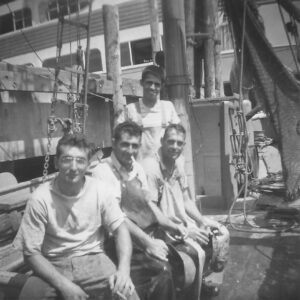
Seated in the foreground are Anthony Joseph, Victor Peters, and Johnny Santos. (Photo courtesy Salvador R. Vasques III)
Lisa King, a member of the museum’s collections committee, is also pursuing a more distant plan for a historical museum in the Freeman Building at 330 Commercial St. There was talk earlier this year of the Vasques collection being part of the new institution, but King said on Monday, “I don’t see a problem at all with Sal’s collection going to the PMPM.” She said she envisioned a collaborative relationship between the Provincetown Museum and the proposed historical museum downtown.
In March 2023, during the acquisition moratorium at the museum, this writer introduced Vasques to Christine McCarthy, CEO of the Provincetown Art Association and Museum, through email. My thought was that his collection might make a valuable research and curatorial adjunct to PAAM’s collection if it could not find another home. Nothing came of that idea.
“This is good news,” McCarthy wrote in an email Monday about the Vasques donation. “I believe with the change in leadership at PMPM and the [Vasques] collection meeting their mission much more than ours, this makes good sense.”
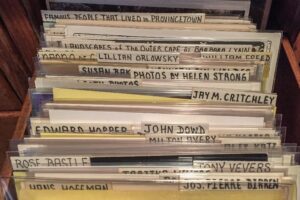
Hurst has been on the board of the PMPM for 12 years, five of those as its president. She is also among the candidates for the permanent post of executive director. Asked about the long freeze on acquisitions, Hurst said the organization had been directing its spending in recent years on the inclined elevator and on attracting event business.
“Now is the time to use that money to focus on the collection,” Hurst said. “This is the first step in the long march toward bringing the museum up to where it ought to be.”
David W. Dunlap, a retired New York Times reporter and columnist, is curator of the Museum at The Times and editor of Provincetown Encyclopedia.



